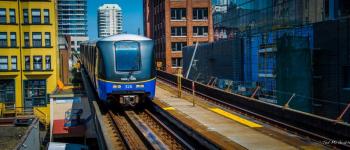With only three weeks left to vote in the Metro Vancouver Transit and Transportation Referendum, less than 30 per cent of residents have cast their ballots. If you're a procrastinator like me and that referendum package is hiding somewhere underneath last month’s bank statements, this reminder is for you. In case you haven't decided how you intend to vote, here is my take on the referendum, from a feminist perspective.
I'm sure you've heard how voting YES will keep Vancouver livable as we gain 1 million new residents by 2045. How voting YES will protect the environment. How voting YES will reduce traffic congestion and provide better commuting options. But you probably haven't heard how voting YES will promote women's equality.
The simple fact is, safe, reliable and accessible transit is a women’s issue. Women rely on transit more than men. A Case Study on public transportation use in Western Europe and North America found that 75 per cent of all bus journeys are undertaken by women. One reason for this might be that only 30 per cent of women have access to the use of a car during daytime hours.
Not only do women use public transportation more than men, we also use it differently. Women do not simply go from place A to place B in a day, for example from home to work. Rather, as primary caregivers and members of the informal and formal labour force, women make more complex journeys. One trip may involve multiple destinations for diverse purposes like dropping children off at daycare or school, going to work or picking up groceries. It is very common for women to have to get off at multiple destinations, pay multiple fares and travel during off peak hours. Many women, particularly women of colour, need affordable and 24-hour public transit because they are concentrated in low-wage, night shift, temporary or part-time work. As such, by necessity they must travel through the city very early in the morning and late at night when public transit is typically unreliable and trips less safe.
Women also experience public transportation spaces differently because of the diverse forms of gender-based violence that occur on a daily basis, including sexual abuse, harassment, groping, the use of vulgar language, intimidation and assault. A study by the World Bank in Peru concluded that while men's first priority with public transit is speed, women's is personal security. Accessibility is also a priority for women. More often than men, women must navigate public transportation while carrying small children, children’s strollers and packages.
For all of these reasons, women need accessible transportation that runs reliably off commuter channels and outside of peak hours. Transportation that takes us near schools, daycares, shops and employment locations so we may have access to education, healthcare resources and employment opportunities. We need well-maintained footpaths, pedestrian streets, bike lanes and well-lit sidewalks that connect us to bus stops and SkyTrain stations. And we need all of this to be affordable.
The Mayors' Council Vision may not address all of these needs, but it does make important strides. Here are some of the highlights of the Vision:
1. Transit will be accessible to more residents across Metro Vancouver
• Light rail transit will be expanded into Surrey and Langley to offer more reliable transportation to these rapidly growing communities.
• Bus service will be improved in new and growing lower density neighbourhoods across the region.
• HandyDART service will increase by 30 per cent.
2. Transit will run more frequently, outside of peak hours.
• Bus service will be increased 25 per cent across Metro Vancouver.
• All-day bus service will be more frequent, with a significant expansion of the routes that provide service every 15 minutes or better, all day, seven days a week.
• 70 per cent of Metro Vancouver residents will have transit service so frequent throughout the day a schedule is not needed.
• Night bus service will increase by 80 per cent.
3. There will be more safe alternatives to transit.
• There will be 2,700 kilometers of new bikeways, including 300 kilometers of fully traffic separated routes making cycling a safer choice for both cyclists and motorists.
• Walking and waiting facilities at or near transit stops and stations will be improved for better connections to transit.
4. Moving around the city will take less time.
• Traffic congestion will be reduced saving drivers and transit users 20-30 minutes per day on many of the region’s most congested corridors.
If the referendum does not pass, we are looking at a deterioration in our existing levels of transit. The Mayors' Council estimates that within 10 years we will need an additional $140 million per year just to maintain the quality of service and infrastructure we currently have. Even with this level of investment we will likely see worse overcrowding, more passengers being passed up by full buses and trains, no new or expanded transit service for growing communities and no new investment in pedestrian connectivity or safety. For women, this will mean more difficult access to transit, more time spent waiting for transit and fewer safe alternatives to transit.
Seems like an obvious choice to me. Vote YES. Support the women of Metro Vancouver.




Comments
Do
Don't